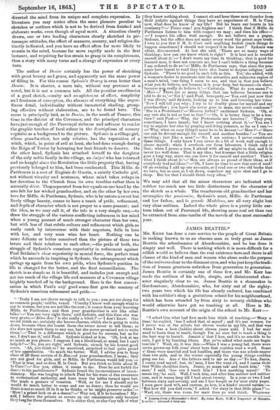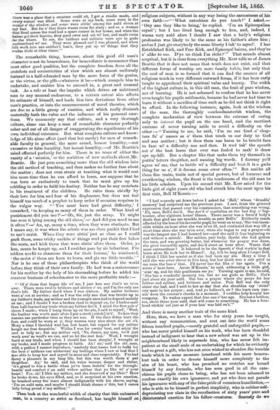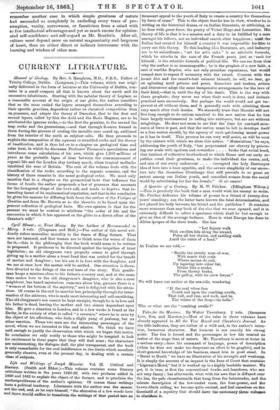JAMES BEATTIE.*
Mu. KERR has done a rare service to the people of Great Britain in making known to us an obscure man so truly great as James Beattie the schoolmaster of Aberdeenshire, and he has done it simply and well. There is nothing which it is more difficult for a selfish world to believe than the real existence here and there in all classes of the kind of men and women who alone make the purpose of the universe clear to the dimmest eyes, and who just keep the tradi- tion of human greatness unbroken from generation to generation. James Beattie is certainly one of these few, and Mr. Kerr has made the outlines of his noble, simple, and disinterested char- acter singularly clear to us. James Beattie is a shoemaker in Gordonstone, Aberdeenshire, who, for sixty out of the eighty- two years two which his life has already endured, has combined with his cobbler's shop a gratuitous school for his neighbourhood, which has been attended by frbm sixty to seventy children who would otherwise have got no teaching at all. Here is Mr. Beattie's own account of the origin of the school to Mr. Kerr:— "I asked him what had first made him think of teaching.' Mony a time.' he replied, 'hoe I asked that at mysel'; and it's use wormer, for I never was at the schule but eleven weeks in my life, and that was when I was a loon (laddie) about eleven years auld. I had far mair need to learn than to teach, though I'm no sure but to teach a thing is the best way to learn't. Amaist a' that I ken, and it's no muckle to be sure, I got it by learning ithers. But ye've asked what made me begin teachin'? Weal, sir, it was this :—When I was a young lad, there were seven grown-up folk roun' about here that couldna read a word. Some o' them were married and had families, and there was use schule nearer than twa mile, and in the winter especially the young things couldna gang sae far. Ane o' the fathers said to me ae day :—' Ye ken, Jamie, I canna read mysel', but, oh! man, I ken the want o't, and I canna thole that Willie shouldna learn. Jamie, ye mann tak' and teach him." Oh man,' I said, hoo can I teach him ? I ken naething mysel ." Ye mann try,' he said. Well, I took him, and after him anither and anither cam, and it wasna lang till I had about twenty. In a year or twa I bad between sixty and seventy, and sae I hae keepit on for near sixty years. I soon grow used wi't, and custom, ye ken, is a kind o' second nature.'— Bat how did you find room,' I asked, for sixty in that little pplace?'- '
Weel, sir, there was room for mair than ye wud think. Wherever
• Lessons from a Shoemaker's Stool. By John Kerr, H.M.'s Inspector of Schools. Lm toe : A lexand Stra•mn. there was a place that a creature could sit, I got a stoolie made, and every corner was filled. Some were at my back, some were in the corner o' the window, and some were sittin' among the auld shoon at my feet. But for a' that there wasna room for sixty ; and so a woman that lived across the road had a spare corner in her house, and when the bairns got their lessons, they gaed ower and sat wi' her, and made room for the ithers. Ye see, the faithers and mithers were aye in gude neebourhood wi' me. They were pleased and I was pleased, and when folk work into ane anther's han's, they put up wi' things that they wudna thole at ither times.'" The remarkable thing, however, about this good old man's character is not its benevolence, for benevolence is commoner than most other good qualities, but the complete freedom from all the crotchets and eccentricities of view which are almost uniformly fostered in a half-educated man by the mere force of the genius, or the virtue, or the gift—whatever it be—which compels him to undertake, and enables him to succeed in, a great and unusual task. As a rule at least the impulse which drives an unlettered man to any unusual endeavour, to a certain extent also affects his estimate of himself, and leads hint into deviations from other Men's practice, or into the announcement of novel theories, which are due to a little .group of vanities, and which really diminish materially both the value and the influence of his personal exer- tions. We commonly say that culture, and a very thorough culture, alone can dreep a man of remarkable character perfectly sober and out of all danger of exaggerating the significance of his own individual existence. But what complete culture and know- ledge of life alone effect (and that but rarely) for men of remark- able faculty in general, the mere sound, honest humility,—not excessive or false humility, but honest humility,—of Mr. Beattie's mind effected perfectly for him. There is no trace of either the vanity of a' mission,' or the ambition of new methods about Mr. Beattie. He just puts something more than the old wisdom into the old method of teaching, and then makes no further fuss about the matter ; does not even strain at teaching what it would cost him more time than he can afford to learn, nor suppose that he was born so exclusively to teach that he must give up his cobbling in order to fulfil his destiny. Neither has he any crotchets in his treatment of the children. He rules them chiefly by their love for him and fear of his displeasure, 'but does not feel himself too much of a prophet to keep order if occasion requires in the vulgar way. " You must have had great difficulty,' I remarked, ' in keeping so many of them in order. What kind of punishment did you use ?'—' Oh, Sir, just the strap. Ye might hae seen it lying among the old shoes,'—' And did you need to use it often?'—' Au, ay, nanny a time, when they were obstinate. But I maun say, it was when the schule was sae close packit that I had to use't maist. When they were aittin' just as close as I could pack them, some tricky nackits o' things wud put their feet below the seats, and kick them that were sittin' afore them. Order, ye ken, maun be keepit up, and I couldna pass by sic behaviour. I've seldom needit to chasteesa them for their lessons,' he continued, the maist o' them are keen to learn, and gie me little trouble.' " Nor is he one of those philanthropists who think of the world before they think of their own family. He had won a maintenance for his mother by the help of his shoemaking before he added his amateur business of schoolmaster to the more profitable trade :- "' Of a' them that began life wi' me, I just ken ane that's no ta'en awa'. There were twelve brithers and sisters o' us, and I'm the only ane that's left. My faither dee'd when I was sixteen. My snider brithers were a' cot at service ; and as I was the only ane that was brocht up to my faither's trade, my mither and the younger anew had to depend maistly on me • and I thooht I was a broken reed to depend on, for I hadna mair than half-learned my trade when my faither dee'd. I mind the first pair o shoon I made ; when I hung them up on the pin, I said to mysel', ' Weal, the leather was worth mair afore I put a steak [stitch] in't'. Ye ken they werena sae particular then as they are noo. If the shoe didna hurt the foot, and could be worn at a', they werena very nice aboot the set o't. Mony a time I thocht.I wud has lost heart, but regard for my mither keepit me free despairin.' Whiles I was for ownin' beat, and aakin' the rest to help us ; but my mither said, 'Na, Jamie, my man, we'll just work awa' as weel's we can, and no let the rest ken.' Wed: I wrought hard at my trade, and when I should hae been sleepin', I wrought at my books, and I made progress in baith. Ah ! sir,' said the old ,man, with a pathos I cannot reproduce, naebody that hasna had to feoht for the best o' mithers can understan' my feelings when I saw at last that I was able to keep her and Elyse!' in meat and class respectably. I've had liwny a pleasure in my lang life but this was worth them a' put thegither. Ay,' he said, and his voice became deeper and richer, it's grand to win a battle when ye've been fechtin' for the through- bearin' and comfort o' an auld widow mither that ye like wi' a' your heart ! For, oh! I likit my mither, and she deserved a' my likin'.' Here he broke down, his eyes filled, and, as if surprised at his own emotion, he brushed away the tears almost indignantly with his sleeve, saying, I'm an auld man, and maybe I should think shame o' this, but I canna help being proud o' my mither.'
Then look at the wonderful width of charity that this unlearned man, in a country so strict as Scotland, has taught himself on religious subjects, without in any way losing the earnestness of his own faith :—"' What catechism do you teach?' I asked.- ' Ony ,ane they like to bring,' he replied. 'I'm an Episcopalian mysel'; but I has lived lang enough to ken, and, indeed, I wasna very auld afore I thocht I saw that a body's religious profession was likely to be the same as his faither's afore him ; and so I just gie everybody the same liberty I tak' to mysel'. I has Established Kirk, and Free Kirk, and Episcopal bairns, and they're a' alike to me. D'ye no think I'm right?"' That sounds almost sceptical, but it is clear from everything Mr. Kerr tells us of James Beattie that it does not mean that truth does not exist, and that different forms of worship are mere family habits, but only that the soul of man is so formed that it can find the essence of all religious truth in very different outward forms, if it has been early taught to apprehend their spiritual value and beauty. The width of the highest culture is, in this old man, the fruit of pure wisdom, not of learning. He is not ashamed to confess that he has never even taught his pupils arithmetic, because he had never had time to learn it without a sacrifice of time such as he did not think it right to afford. In the following instance, again, look at the wisdom of the man, the thoroughly torschoolmasterish wisdom, the complete moderation of view between the extreme of caring only to interest the pupil on the one hand, and the martinet extreme of never turning aside to avoid a difficulty on the other :—." Turning to me, he said, ' Fin no sae fond o' chap- ters fu' o' names as o' them that teach us our duty to God and ane anither ; but it does them nae harm to be brocht face to face wi' a difficulty noo and then. It wad tak' the apeerit oot o' the best horse that ever was foaled to mak' it draw aye up-hill. But a chapter like that maks them try themsel's in puttin' letters thegither, and naming big words. I daursay ye'll agree wi' me, that to battle wi' a difficulty and beat it is a gude thing for us a', if it doesna come ower often." But amidst all these fine traits, traits not of special powers, but of humane and overflowing wisdom, the finest is the tenderness of the old man to his little scholars. Upon his second visit Mr. Kerr asked for the little girl of eight years old who had struck him the most upon his first visit, Bell M'Kenzie :— " I had scarcely sat down before I asked for 'Bell,' whose dreadfu" memory' had surprised me the previous year. I saw, from the grieved
expression that passed over his countenance, that something was wrong. Eh, man, Bell's dee'd. She dee'd o' scarlatina on the last day o' Sep- tember, after eighteen hours' illness. There never was a frem'd body's death that gied me sae muokle trouble as puir Bell's.' Evidently mach
affected by the loss of his favourite pupil, he went on to say, 'She was insen- sible within an hour after she was ta'en ill, and continued that way till a short time afore she was ta'en awn', when she began to say a prayer—it was the langest ane I had learned her—and she said it frae beginning to end withoot a mistak'. Her mither, pair body, thooht she had gotten the turn, and was growing better, but whenever the prayer was dune, she grew insensible again, and dee'd aboot an hour after. Waana that most extraordinar? It behoved to be the Speerit o' God workin' in that bairn afore He took her to Himael'. Ay, it'll be lang afore I forget Bell. I think I likit her ausaist as if she had been my ain. Mony a time I said she was ower clever to live hog, butt her death was a Bair grief to me nane the less o' that. I'll never hae the like o' her again. I've a sister o' hers here. Annie M'Kenzie,' he said, addressing a little girl, 'stun' up, and let this gentleman see ye.' Turning again to me, he said, She has a wonderfu' memory too, but no sae gude as Bell's. She's just aboot six year mild. She has a prayer where she prays for her faither and mither, and brithers and sister. Puir Bell was the only sister she had, and I said to her ae day that she shouldna say sister' ony mair in her prayer ; and, wud ye believe't, sir ? the tears cam run- ny' doon the creator's cheeks in a moment. I couldna help keepin' her company. Ye wudna expect that free ane o' her age. She has a brither, too, aboot three year anld, that will come to something. He has a fore- head atiokin' cot just as if your han' was laid on't."
And there is many another trait of the same kind.
Here, then, we have a man who for sixty years has taught, without any remuneration, and sent out into the world some fifteen hundred pupils,—mostly grateful and unforgetful pupils,— who has never prided himself on his work, who has been thankful instead of indignant to hear that a new school was set up in the neighbourhood likely to supersede him, who has never felt im- patient at the small scale of an undertaking for which he evidently had so great a gift, who has not even wished to abandon the humble trade which in some measure interfered with his more benevo- lent task in order to devote himself more completely to the aim of his heart, who has preached no crotchet nor bound himself by any formula, who has seen good in all the cate- chisms his pupils chose to bring, who has not been ashamed to confess exactly his own ignorance, and yet who does not parade his ignorance with any of the false pride of conscious humiliation,— who is able to be himself in perfect simplicity, who is neither self- depreciating nor elate in the recollection of sixty years' pure and disinterested exertion for his fellow-creatures. Scarcely do we
remember another case in which simple greatness of nature had succeeded so completely in excluding every trace of pre- sumption, vanity, narrowness, or fanaticism from a mind with so few intellectual advantages and yet so much excuse for opinion- ated self-confidence and self-regard as Mr. Beattie's. After all, culture must depend more on natural magnanimity and largeness of heart, than on either direct or indirect intercourse with the learning and wisdom of other men.
































 Previous page
Previous page